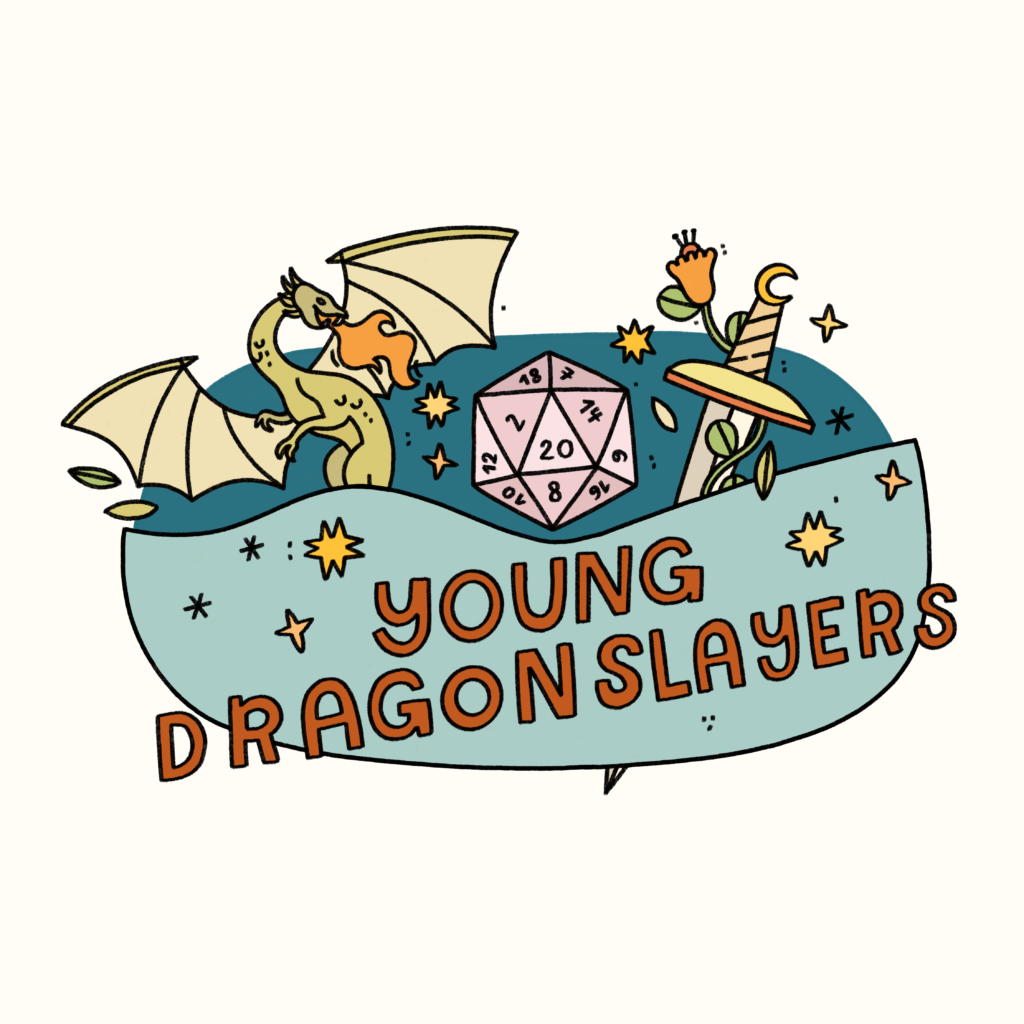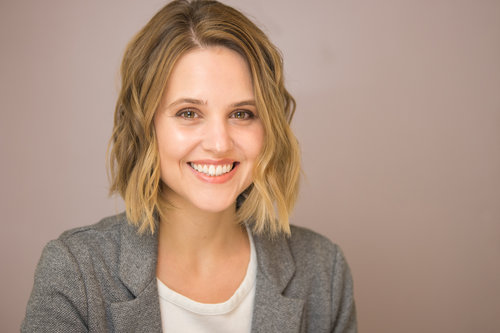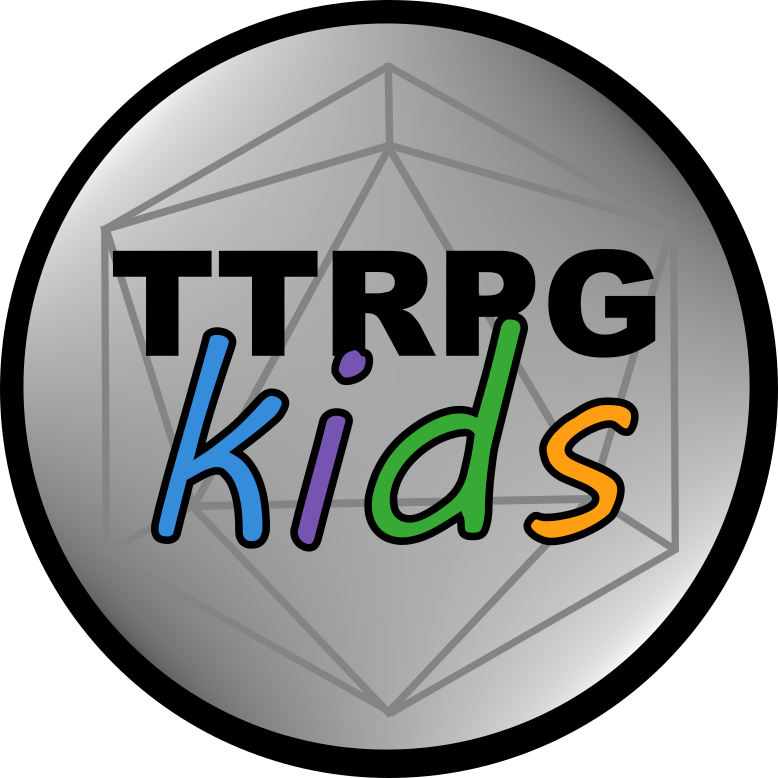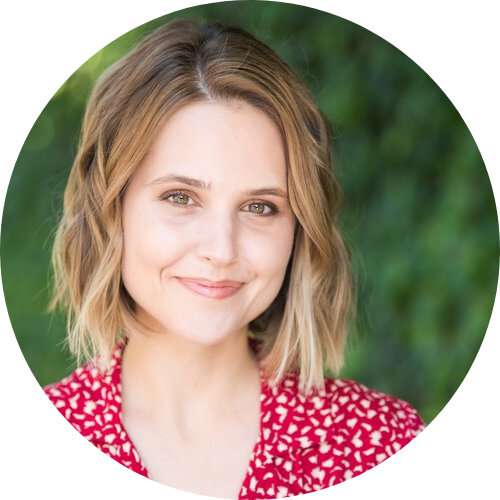Interview with Katie Lear, counselor, therapist, and founder of Young Dragonslayers!
Note: the answers to questions from this interview are from Katie from Young Dragonslayers and are posted by TTRPGkids with her permission
Can you tell us a little about yourself?
I’m a counselor, play therapist, and drama therapist who specializes in childhood anxiety and OCD…but before I was any of those things I was a super anxious kid who struggled to get to school every day.
I was also a theater nerd: I started really young, and theater was a place where I felt like I fit in and was good at something. There were many days when the only reason I went to school was so that I could go to play practice after class.
Like a lot of us, I started offering online D&D games during the pandemic, hoping that I could recreate that “drama class” sense of community for kids in an online space during a really hard time. To my surprise and delight, the project grew beyond my expectations, and Young Dragonslayers was born!
When did you start playing TTRPGs and what is your favorite moment?
I started playing D&D when I moved from New York City to a small college town in North Carolina, where I live now. My husband and I got invited to join a new campaign with some of his coworkers from the college theater department where he works.
I’m a longtime McElroy fan and devoured the first arc of The Adventure Zone, but assumed I wouldn’t be good at the game because it involved math and numbers. However, I was intrigued and I knew nobody in town and really needed to meet people. I was happy to discover that D&D is essentially structured improv and very theater kid-friendly. And it’s an excellent way to get to know people quickly: you learn about people in a much deeper way than you would just standing around talking at a party, I think.
As far as favorite moments…I was playing Kids on Bikes with some friends recently, and as I’m sure many readers know you get an NPC with magical powers in that game that’s controlled by the group. Our GM revealed that the powered character was my former character from a long-lost, never finished D&D campaign we’d started with some of our close friends who moved away. We all miss them, and it was such a fun callback to a really nice time in our lives.
I have a lot of favorite moments from our games with kids. We just ran Curse of Strahd with two of our longtime groups, and that was just the best: there were whisper campaigns launched about Strahd wetting the bed, legions of spectral beavers chewing down windmills, and at one point Barovia was renamed “Ohio” because it was sad and gray. No offense to my friends in Ohio!
What does Young Dragonslayers do?
Young Dragonslayers is an online social club that uses D&D to help kids create meaningful friendships with peers and practice social-emotional skills online. We started our first group during the pandemic to try to help kids feel more connected during social distancing, but even as we’ve come out of the pandemic it’s become clear that online activities are still valuable for a lot of kids.
There are a lot of reasons why kids (and their parents) might be looking for online ways to socialize. Many of our players are looking for “their people.” Sometimes that’s because of life circumstances, like homeschooling or a recent move. Other times they’re just looking for other kids with similarly niche interests who are ready to geek out over anime or Greek mythology.

We also get lots of kids who are simply dying to play D&D: they’ve practically memorized the entire Player’s Handbook but are still waiting for their time to shine. D&D is a big time commitment and not everybody can convince their friends to do it! I love that we can take these super devoted, committed kids and get them together to play a campaign through to the end…that doesn’t always happen in “real life” adult games so it’s really satisfying to see stories reach a solid conclusion.
Since the social aspect is important to us, we try really hard to match kids up with peers who we think they’re likely to get along with. We interview every family that’s interested in our games, and kids have the option to join us for a trial session, as well. After that, we have a pretty good idea of everyone’s personality, and try to group kids together based on factors like age, experience level, and whether they’re into a more serious or chaotic style of game play.
How do you use TTRPGs with kids?
At the moment, we’re exclusively using D&D, since that’s what most kids are familiar with. I think it would be really fun to branch out into other TTRPGs at some point! Most of our games rely solely on theater of the mind: we use Zoom to talk to each other and DnD Beyond to manage character sheets.
The games we run aren’t therapeutic: our facilitators work in education and mental health, but they’re not therapists. We’re not diagnosing anybody or creating treatment plans. However, we do think about how we can help kids to have the most positive social experience possible. How can we give them opportunities to practice skills like empathy, negotiation, and creative problem-solving? What are the possible in-game consequences if players are constantly squabbling with each other and can’t reach a compromise?
I’m hoping to get back to running some in-person therapeutic games this summer, but honestly, so many of the benefits I see kids get out of playing D&D are baked into the game itself.
What benefits do you see from using TTRPGs with kids?
I mentioned earlier that I was a theater person, and I think a lot of kids gravitate toward theater because it’s inherently therapeutic. It’s a creative outlet, a tool for empathy, and a safe way to vent all your feelings. Plus, it connects you to a built-in community of friends. I think some kids are drawn to roleplaying games for those same reasons. Just playing the game can be good for your emotional health.
Even though our games aren’t therapy, many of our players are coping with anxiety and depression. That’s not super surprising given the mental health crisis we’re in right now in general, but I do think the game can be extra helpful for these players.
When a person is feeling depressed, one of the big tools we encourage them to try in therapy is something called behavior activation. Depression lies to the brain and makes you think nothing is worth doing, and you can combat that by deliberately scheduling rewarding activities into your week: specifically, things that are creative, social, fun, or provide a sense of accomplishment. D&D checks all those boxes!
The structure of D&D can be freeing for kids with anxiety. We have a good number of neurodivergent players, and I think the structure benefits them, too. It’s easier to be creative and take risks when you have some rules, and since you’re playing a character, it feels a little less personal if you take a risk and fail. Since you all have a shared mission, there’s a focus to your socializing: it’s not just open-ended small talk for 90 minutes.
One of the best things about roleplay is it allows you to be anyone. You can step into anybody’s shoes and imagine what that could be like. You have permission to try new things, even if it means behaving in ways you never would in real life. TTRPGs are a great way to try out new ways of speaking to and interacting with people, and it’s also an opportunity to explore issues related to gender and identity.
What advice do you have for people who are new to TTRPG’s or who are looking to introduce a new player (kids, teens, or adults)?
I would encourage anyone to let go of any pressure they feel to memorize every rule, or come up with the World’s Most Original Character. If your new player isn’t the memorize-the-rulebook type, the sheer amount of information can be super intimidating. Embrace cliches, tropes, and familiar characters. All those things became popular for a reason: they’re fun to play! It’s so much easier (at least for me) to learn by doing, so try to focus on telling a fun story and introduce rules as they arise, rather than front loading all of them before you start playing.
Any shout outs, links, or final words?
Shout out to our DMs! Zack, Ian, and Sergio facilitate our weekly games—as of right now, they’re running 13 games a week. They all work in the education or mental health fields in their non-D&D lives. I think that really informs how they run their games, and I’m lucky to have them around.
If you’re a parent or know of a tween or teen who might be interested in playing with us, you can come check us out at www.youngdragonslayers.com. You can fill out an application there to get on our waitlist, and we’ll let you know about upcoming interview days and trial sessions, too. You can also follow us on Instagram, Facebook, and YouTube to see what we’re up to and consume some kid-friendly D&D content.

Thank you Katie for the awesome interview and for sharing your insights about how much tabletop RPGs help kids! I am very glad to hear that Young Dragonslayers is doing well and reaching so many youth, and I hope it continues to grow!
Please go check out Young Dragon Slayers, and…. If you liked this post, make sure to subscribe to the TTRPGkids monthly newsletter to stay up to date on the latest reviews, tips and tricks, game and podcast list updates, and more! Thank you for playing tabletop RPGs with your kids and sharing this awesome hobby with the next generation!
Looking for more D&D material for kids? Check out my list of D&D for kids adventure, hacks, and rewrites here!


2 thoughts on “Interview with Katie Lear, counselor, therapist, and founder of Young Dragonslayers!”